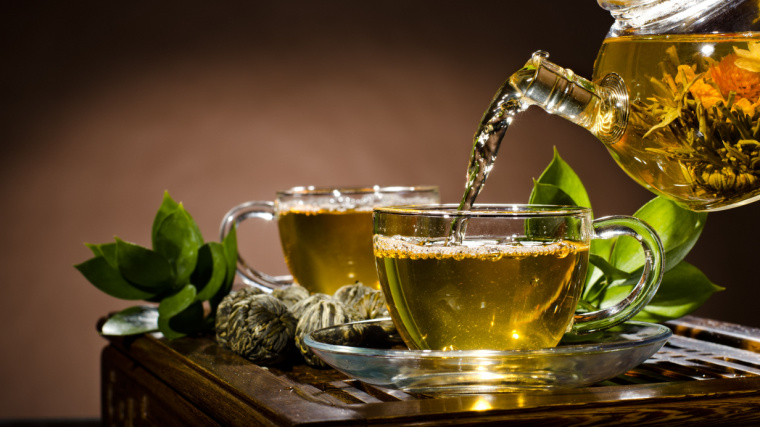If you run a quick internet search on supplements for weight loss, you’ll find thousands of products boasting evidence-based formulas to fuel rapid results. It’s easy to feel lost in the maze of marketing, where it’s hard to separate science from fat loss myths.

Green tea and green tea extracts are prime examples of this phenomenon. They’ve been studied for a wide range of potential uses, from boosting exercise performance to cardiovascular health and even cognition. But can green tea cause weight loss? We’ll lean on the research to help us tease out fact from fiction.
Editor’s Note: The content on BarBend is meant to be informative in nature, but it should not be taken as medical advice. When starting a new training regimen and/or diet, it is always a good idea to consult with a trusted medical professional. We are not a medical resource. The opinions and articles on this site are not intended for use as diagnosis, prevention, and/or treatment of health problems. They are not substitutes for consulting a qualified medical professional.
How Weight Loss Works
First, it’s important to clarify how weight loss works. Take “fat oxidation,” for example. It’s logical to conclude that more fat oxidation, or fat burning, would lead to fat loss — but that isn’t quite the case. (1)
Many factors can influence whether your body relies more on fats or carbohydrates for energy. In either case, those can come from your body or your diet. That means you can increase fat oxidation, but it doesn’t necessarily translate to a reduction in body fat. (1)
[Read More: How to Lose Weight Fast, According to Science]
Fat loss requires one thing: an energy deficit. In other words, as long as you’re burning more calories — which are simply units of energy — than you’re taking in, you’ll generally lose body fat.
Of course, your nutritional habits can have a significant impact on your health and athletic performance, but you don’t need to follow a specific diet to lose body fat percentage. (2) If you’re using more energy than you’re taking in, you’re likely to lose weight.
How Green Tea Could Aid Weight Loss
You don’t need to take a supplement to support fat loss. Still, it is possible that a supplement could increase your energy deficit by elevating your energy expenditure, reducing your energy intake, or both.
Green tea, which is made from the dried leaves of the Camellia sinensis plant, has long been a staple in Chinese medicinal practices. In Western markets, it’s often said to help control body weight.

[Read More: How to Burn Fat for Weight Loss and More Definition]
Several different mechanisms explain green tea’s other effects on things like cognition or athletic performance. But green tea’s purported weight-loss benefits come from its ability to influence your metabolic rate (or energy expenditure) and fat metabolism.
In other words, green tea is often said to increase your metabolism, supposedly leading to more fat-burning and weight loss. Here’s the science breakdown.
What Is the “Active Ingredient” In Green Tea?
Specific polyphenols, known as catechins, likely explain the health benefits of green tea. Although green tea contains several other catechins, epigallocatechin-3-gallate (EGCG) appears to be the most potent.
Green tea also contains caffeine, which works synergistically with EGCG. While other varieties, like black tea and oolong tea, also contain beneficial antioxidants and polyphenols, green tea provides the most due to its shorter processing time.(3)(4)
Green tea extract contains even higher concentrations of these catechins, especially epigallocatechin-3-gallate (EGCG), making it a common ingredient — often alongside caffeine — in weight loss products. (3)
Increased Energy Expenditure and Fat Oxidation
Both EGCG and caffeine can individually increase thermogenesis or energy expenditure, but they’re more effective in combination. Since green tea is a natural source of both compounds, it could aid weight loss by causing your body to burn calories without a change in your activity level. (3)(4)(5)(6)
In addition to greater energy expenditure, green tea could in
Green tea could reduce fat intake (and thereby energy intake) by suppressing both appetite and certain digestive enzymes required for intestinal fat absorption. It may also prevent the formation of new fat cells. (3)(4)(5)(6)
Do Green Tea Supplements Work?
It’s important to keep in mind that much of the research on mechanisms was carried out in rodents or fat cells, not humans. These studies don’t tell us much about whether green tea or its extracts actually work.
[Read More: Do Fat Burners Work?]
Instead, we need to look at the results of well-designed human studies to determine whether these potential pathways lead to real-world outcomes that won’t waste your money or risk your health.
You Won’t Burn That Many Extra Calories from Tea Alone
A change in energy expenditure or fat oxidation can be statistically significant without delivering meaningful physiological changes. For example, compared to a caffeine-only supplement, a catechin-caffeine supplement led to greater elevations in 24-hour energy expenditure and fat oxidation compared to a placebo. (7)
The increases were relatively minor, though, at about 0.12 kilocalories per milligram (kcal/mg). The average cup of green tea contains 50 to 100 milligrams (mg) of catechins, which means you can expect to burn an additional 6 to 12 calories after drinking one. The effects on fat oxidation were even smaller. (3)(7)
[Read More: The 8 Best Fat Burners for Women]
Your Takeaway: Yes, green tea might technically help you burn a few more calories, but not enough to make a difference overall.
Supplements Could Lead to Weight Loss in Some Groups
There is some evidence that supplemental green tea extracts could lead to some weight loss — about 2.5 to 5 kilograms — in people with metabolic syndrome or polycystic ovarian syndrome (PCOS), but their effectiveness seems to vary by ethnicity. (4)(6)(7)
However, weight loss isn’t synonymous with fat loss. It’s unclear what effect the supplements had on body composition, which is arguably a better predictor than weight of overall health and longevity. (9) Green tea extracts also had no effect on waist circumference, which has been used to assess metabolic health and cardiovascular disease risk. (4)(6)

[Read More: The 8 Best Weight Loss Programs of 2024]
Your Takeaway: In people with metabolic syndrome or PCOS, green tea extracts may spur some weight loss. But weight loss and fat loss aren’t the same thing, and body composition and waist circumference in participants were not clearly impacted by green tea extracts.
A More Effective Supplemental Dose Could Be Riskier
Catechin concentrations in green tea supplements are not standardized. They may range from as little as five milligrams up to 1,000 milligrams of EGCG and other catechins. Based on researched estimations, 800 milligrams of catechins might lead to a slightly more impactful elevation in energy expenditure of nearly 100 calories. (7)(10)
However, doses higher than 800 milligrams of green tea catechins have been linked to liver toxicity, and some people may have a genetic predisposition that leaves them more susceptible to these harmful side effects. (10) So, a more effective dose likely comes with greater health risks.
Your Takeaway: It can be toxic to your liver to ingest a level of green tea extract that could help burn more calories.
So, Should I Take A Green Tea Supplement?
What to do with all this information? Here are your big takeaways:
- One could say that catechins — a component in green tea — whether in the form of tea or supplements, “work” to increase energy expenditure and fat oxidation.
- Real-world results indicate that green tea supplements may lead to some additional weight loss — with unclear effects on body composition — and only in certain people.
- If you’re already metabolically healthy, it’s unlikely that you’ll see any weight-specific benefits to using green tea supplements.
- If you do decide to add a green tea supplement as part of a weight management plan, keep in mind that higher doses come with more risks (for example, liver toxicity) that could outweigh any potential benefits.
FAQs
With all the info out there, you’re bound to still have questions. That’s cool. We’ve got answers.
Does green tea reduce belly fat?
In most cases, green tea doesn’t appear to reduce waist circumference, which suggests that it does not reduce belly fat.
Is green tea an appetite suppressant?
While green tea could suppress appetite, the evidence is still inconclusive. It may have appetite-suppressive effects in certain people or under certain conditions, but the results are so variable that it can’t be classified as such. (11)
How much green tea should I drink a day to lose weight?
Fat loss (which generally leads to weight loss) is the result of a calorie deficit, and without one, no product will induce weight loss. Plus, green tea alone doesn’t provide enough catechins to increase energy expenditure (i.e., calorie burn) to a meaningful extent.
Supplemental doses of 400 to 500 milligrams could lead to some weight loss in certain people, but doses above 800 milligrams may increase the risk of liver toxicity.
References
- Gribok, A., Leger, J. L., Stevens, M., Hoyt, R., Buller, M., & Rumpler, W. (2016). Measuring the short-term substrate utilization response to high-carbohydrate and high-fat meals in the whole-body indirect calorimeter. Physiological reports, 4(12), e12835.
- Strasser, B., Spreitzer, A., & Haber, P. (2007). Fat loss depends on energy deficit only, independently of the method for weight loss. Annals of nutrition & metabolism, 51(5), 428–432. https://doi.org/10.1159/000111162
- Hursel, R., Viechtbauer, W., Dulloo, A. G., Tremblay, A., Tappy, L., Rumpler, W., & Westerterp-Plantenga, M. S. (2011). The effects of catechin rich teas and caffeine on energy expenditure and fat oxidation: a meta-analysis. Obesity reviews : an official journal of the International Association for the Study of Obesity, 12(7), e573–e581.
- Zhong, X., Zhang, T., Liu, Y., Wei, X., Zhang, X., Qin, Y., Jin, Z., Chen, Q., Ma, X., Wang, R., & He, J. (2015). Short-term weight-centric effects of tea or tea extract in patients with metabolic syndrome: A meta-analysis of randomized controlled trials. In Nutrition and Diabetes (Vol. 5). Nature Publishing Group.
- Morsali, M., Poorolajal, J., Shahbazi, F., Vahidinia, A., & Doosti-Irani, A. (2021). Diet therapeutics interventions for obesity: A systematic review and network meta-analysis. In Journal of Research in Health Sciences (Vol. 21, Issue 3). Hamadan University of Medical Sciences.
- Shen, W., Pan, Y., Jin, B., Zhang, Z., You, T., Qu, Y., Han, M., Yuan, X., & Zhang, Y. (2021). Effects of Tea Consumption on Anthropometric Parameters, Metabolic Indexes and Hormone Levels of Women with Polycystic Ovarian Syndrome: A Systematic Review and Meta-Analysis of Randomized Controlled Trials. In Frontiers in Endocrinology (Vol. 12). Frontiers Media S.A.
- Shahinfar, H., Jayedi, A., Torabynasab, K., Payandeh, N., Martami, F., Moosavi, H., Bazshahi, E., & Shab-Bidar, S. (2023). Comparative effects of nutraceuticals on body weight in adults with overweight or obesity: A systematic review and network meta-analysis of 111 randomized clinical trials. In Pharmacological Research (Vol. 196). Academic Press.
- Jówko E. Green Tea Catechins and Sport Performance. In: Lamprecht M, editor. Antioxidants in Sport Nutrition. Boca Raton (FL): CRC Press/Taylor & Francis; 2015. Chapter 8.
- Willoughby, D., Hewlings, S., & Kalman, D. (2018). Body Composition Changes in Weight Loss: Strategies and Supplementation for Maintaining Lean Body Mass, a Brief Review. Nutrients, 10(12), 1876.
- EFSA ANS Panel (EFSA Panel on Food Additives and Nutrient Sources added to Food), Younes, M., Aggett, P., Aguilar, F., Crebelli, R., Dusemund, B., Filipič, M., … Wright, M. (2018). Scientific Opinion on the safety of green tea catechins. EFSA Journal, 16(4), 5239.
- Stuby, J., Gravestock, I., Wolfram, E., Pichierri, G., Steurer, J., & Burgstaller, J. M. (2019). Appetite-Suppressing and Satiety-Increasing Bioactive Phytochemicals: A Systematic Review. Nutrients, 11(9), 2238.
Featured Image: Aleksey Mnogosmyslov / Shutterstock